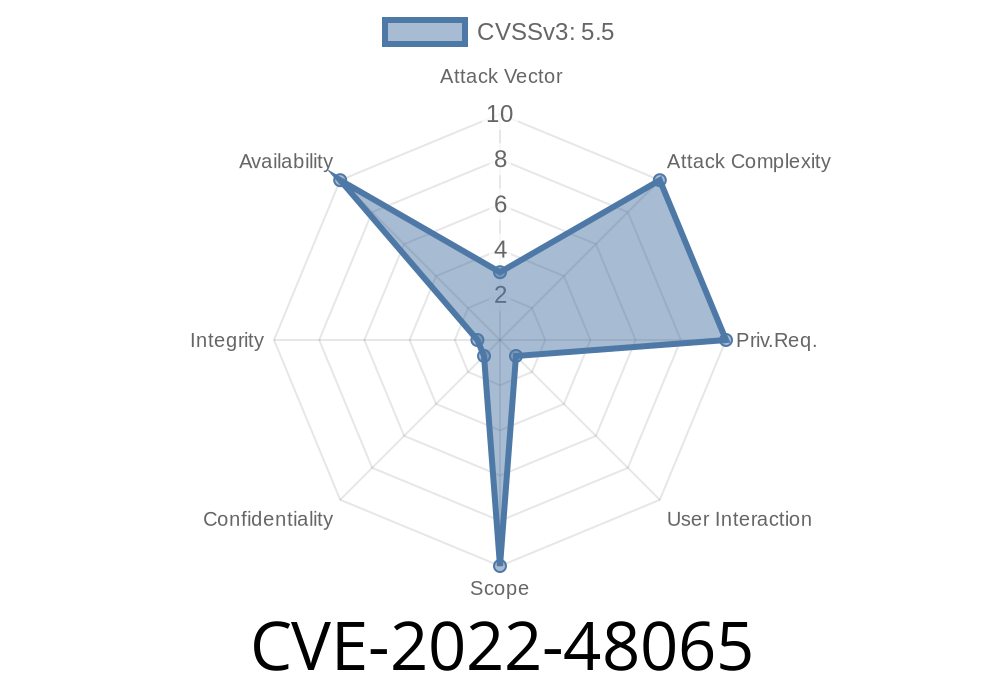In the world of open-source tools for binary manipulation, GNU Binutils stands out. It's the backbone for assembler, linker, and a set of utilities that help developers and researchers work with object files. But even essential tools like Binutils aren't immune to security flaws — especially in complex areas like debugging information processing. In late 2022, researchers uncovered a flaw that could, under the right circumstances, lead to a memory leak when handling DWARF debugging data.
That bug was assigned CVE-2022-48065 – let’s break it down in simple terms and show how it works.
What is CVE-2022-48065?
This is a memory leak vulnerability discovered in GNU Binutils versions before 2.40, specifically in the function find_abstract_instance inside the dwarf2.c source file. Binutils uses this function to process DWARF debugging info — data embedded in binaries for debugging.
When triggered, memory that should have been freed remains allocated, even when it is no longer needed. In situations where Binutils tools (like objdump or readelf) repeatedly process malicious or crafted files, this can lead to uncontrolled memory growth and eventually crash the system or affect other running processes.
Reference:
- NIST NVD Page for CVE-2022-48065
- GNU Binutils Bugzilla - Bug 29933 (Original Report)
Why Does the Vulnerability Happen?
The core issue lies in how find_abstract_instance() handles memory allocation when processing DWARF entries. If certain paths are taken — especially when processing recursive DWARF entries — the function allocates new memory but doesn't always free it after it's no longer referenced.
Here's a simplified snippet (not the real code, but to explain the logic)
// Simplified pseudocode
struct abstract_instance* find_abstract_instance(die) {
struct abstract_instance *ai = malloc(sizeof(*ai)); // Allocated here
// ...sometime later, some paths exit without 'free(ai)'
if (found_duplicate) {
// Early return -- memory leaked here!
return existing_ai;
}
// Proper return, ai attached to a list and eventually freed
return ai;
}
In such code, if the function detects a duplicate and returns early, the newly allocated ai isn't freed, causing a leak.
Proof of Concept: Triggering the Leak
While this bug isn't an immediate remote code execution risk, attackers can use memory leaks to perform denial of service attacks by exhausting system memory through repeatedly running the vulnerable tool with specially-crafted binaries.
Here's a very basic proof of concept using a malformed ELF file
# Make a large number of copies to trigger repeated execution
for i in {1..10000}; do
objdump -W malformed.elf > /dev/null
done
If malformed.elf contains crafted DWARF info to hit the leak path, the system's memory will slowly fill up, and you can monitor the memory usage growing abnormally in tools like top or htop.
The Fix
In the Binutils commit for version 2.40, maintainers added code to ensure all early exit or error paths properly free dynamically allocated memory before any return statement. The fix looks like this (simplified):
if (found_duplicate) {
free(ai); // Correctly free before return
return existing_ai;
}
The fix was released and pushed to the Binutils repository. Upgrading to 2.40 or later is strongly advised.
- Upstream Patch Commit
How Big a Deal is This?
- Severity: Medium. It's not remotely exploitable for code execution, but a determined attacker could eat up server resources.
- Impact: Mostly affects users who process untrusted or large volumes of ELF/DWARF files.
- Mitigation: Always keep your tools updated! Don’t process untrusted binaries with older versions of Binutils.
Conclusion
CVE-2022-48065 is a reminder that even non-critical bugs can have security implications, especially in tools used throughout the build and analysis chains. Memory leaks, while sometimes overlooked, can be weaponized for DoS attacks or simply degrade service quality over time.
Upgrade your Binutils to 2.40+ if you haven't yet.
And as always — never trust binaries from unknown sources!
Further Reading
- NIST: CVE-2022-48065
- GNU Binutils Bugzilla - Bug 29933
- GNU Binutils GIT - Source code
Timeline
Published on: 08/22/2023 19:16:31 UTC
Last modified on: 11/15/2023 02:36:07 UTC
